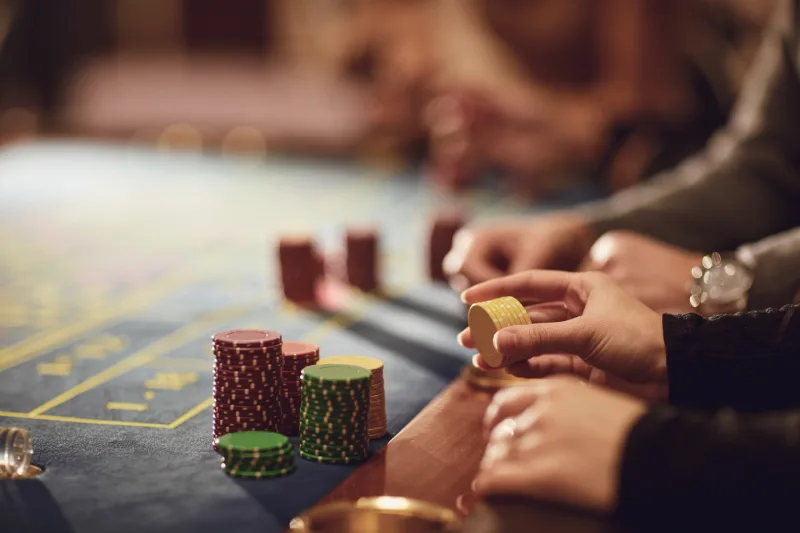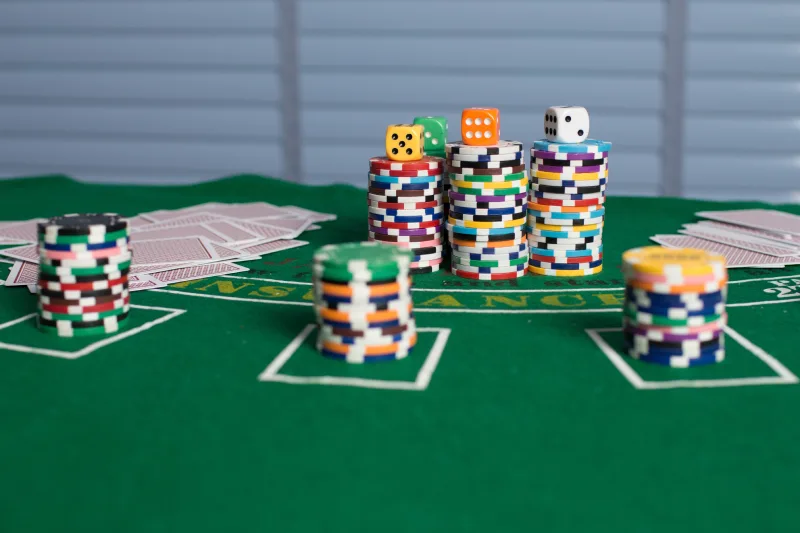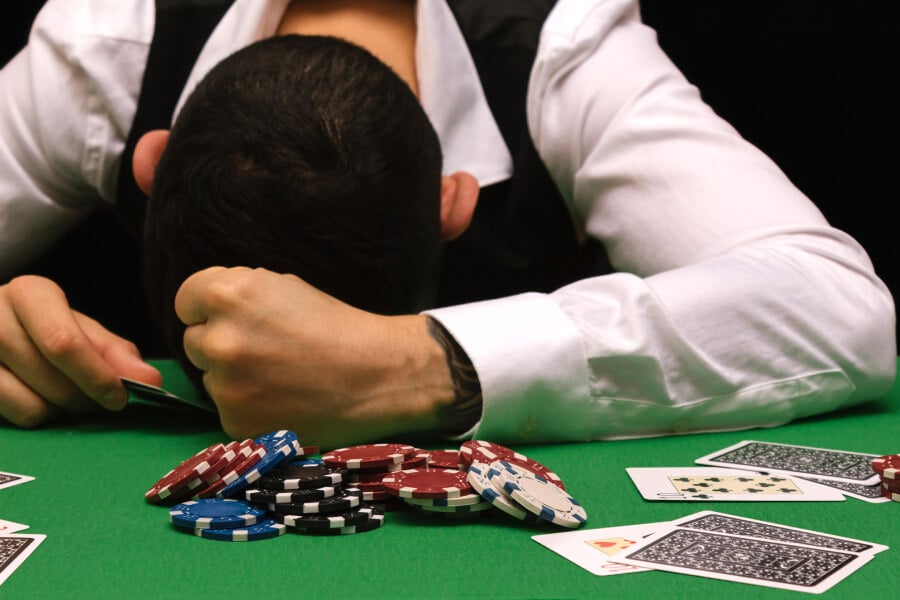No, gamblers with problem gambling addiction or gambling disorders are not actually addicted to losing. The majority of casual gamblers would stop playing when they hit a losing streak. They only gamble what they can afford to lose, which is why smart players often set a budget for gambling and a loss limit.
When most casual gamblers reach their set loss limits, they usually quit or take a break. However, gamblers with compulsive gambling problems continue gambling obsessively to chase their losses.
Gamblers are not essentially addicted to losing, but they’re compelled by their addiction to continue placing often larger bets in a bid to recoup their money. This compulsive gambling behavior of chasing losses can become increasingly problematic with time.
How Gamblers with Problem Gambling Disorders Feel After Losing
Losing a significant wager would warn any regular gambler to cease gambling immediately. But if this is the case, why do gamblers keep betting even after losing a lot of money? Gambling addicts don’t know when they should stop gambling, even if they’ve established a budget and a time cap. The desire to keep gambling promotes greater spending, and ultimately, the unavoidable occurs.
Gambling is more than a source of entertainment. Like exercising, winning a blackjack hand, a sports bet, or a slot jackpot can cause your body to release hormones like endorphins and adrenaline. These neurochemicals make you feel happy, excited, or energized—and the body wants more of them to keep you feeling this way.

Unfortunately, according to a growing body of research, your body can continue producing these happy-feel hormones even when you lose. So, gamblers may seem like they are addicted to losing, as the hormones make the whole thing feel exciting and fun.
Defining Problem Gambling
Problem gambling is sometimes known as gambling disorder or compulsive gambling. It refers to the seemingly uncontrollable desire to continue betting despite the consequences.
By definition, gambling is the act of risking something valuable (such as money), hoping to get something more valuable in return. It can have psychological and biological effects on your body, like alcohol or drugs, resulting in addiction
Someone with a gambling disorder will continually create debt, get into financial problems and chase losses.
Problem gamblers usually hide their behavioral patterns and may even rely on fraud, theft, and other ill means to fuel their addiction.
Problem gambling can be a serious, life-destroying condition. Although it can be difficult to treat gambling disorders, many compulsive gamblers have received help through professional treatment.
What Causes Compulsive Gambling?
The exact cause of gambling disorder is not yet well-known. As with the majority of addictions, problem gambling may be due to a combination of environmental, genetic, and biological factors.
Risk Factors for Compulsive Gambling
While many people gamble without ever developing gambling problems, some factors have been linked to elevated risk for compulsive gambling:
The age of the gambler – Studies have shown that middle-aged and younger individuals are more prone to problem gambling. Gambling early in life (especially during teen or childhood) can increase the risk of developing the problem. Gambling disorder can also be an issue in the older adult population.
Mental health problems – Individuals with anxiety, depression, personality disorders, and substance use disorders are likely to develop pathological gambling. It may also be associated with mental health disorders like ADHD, OCD, and bipolar disorder.
Your personality qualities – Being impulsive, workaholic, highly competitive, easily bored, or restless might elevate your risk of problem gambling.
Gender or sex – Men are more likely to develop gambling problems than women. However, women often begin gambling much later in life and might get addicted faster. Note that gambling problem behaviors among women and men have recently become very similar.
Medication – Some medications for restless legs syndrome and Parkinson’s disease have been found to increase the risk for pathological gambling. This side effect is rare, though.
Family history – As with substance abuse or alcohol addiction, friend and family influence can play a role in developing a gambling addiction. If your friends or relatives have compulsive gambling problems, you’re likely to develop it too.
Problem Gambling Complications
If left untreated, problem gambling can cause massive complications in your life, such as:
- Financial issues
- Legal problems due to fraud and theft
- Relationship issues due to behavior change and financial constraints
- Suicidal thoughts, suicide attempts, and suicide
- Loss of job or productivity at work
- Your health will suffer
How to Prevent Compulsive Gambling
Not much is known about what is happening behind the scenes of compulsive gambling. The medical and academic communities are still doing research and conducting trials. As of writing, there are no tried-and-true ways of preventing compulsive gambling.

However, support systems and educational programs targeting at-risk groups and individuals may help. If you fit the description of someone at risk of problem gambling, you can benefit from avoiding all forms of gambling. Consider avoiding the places and people associated with gambling.
When to Seek Professional Help for Problem Gambling
Have your gambling activities affected your job, relationships, or financial health? Have your work colleagues, friends, or family members showed concern about your gambling? If any of these is true, you should heed their cries and seek professional help.
How can I save money and keep gambling?
It takes time to build a robust bankroll when playing at a casino. Practice the following bankroll management strategies to save your money and keep gambling:
Find and play casino games with good payouts
Casinos offer a huge array of games with varying odds and payouts. The best place to look at is the pay table of a game, which usually indicates the house edge and estimated return to player (RTP). You want to play a game with high RTP and low house edge.
Typical examples are blackjack, baccarat, and video poker titles like Deuces Wild.
Even within the blackjack family, you should look at variants that pay 3 to 2 for a natural blackjack win. Many players swear by full-pay video poker titles like 9/6 Jacks or Better, with an RTP of 99.54%.
Avoid game rules that lower the payback percentage
In blackjack, for instance, you should avoid games that allow the dealer to hit on a soft 17 or pay 6 to 5 for a winning natural blackjack. They give you lower payouts for the same hands; you can get paid more at other tables. Likewise, it would be best if you showed side bets and bonus bets a wide berth because they are designed to favor the house.
Avoid game variants skewed in favor of the house
Some casino games may offer exciting and fun ways to play. But they often remove the key elements that help give you an edge over the casino. For instance, any blackjack game with a push 22 rule, like Switch, or one that takes out tens from the deck, like Spanish Blackjack, will eventually hurt your bankroll.
Set a budget for your casino gambling
Every successful activity starts with a solid plan, and gambling is no different. Setting a budget is the best way to set yourself up for success and save your money. The trick is to set between 5% and 10% of your bankroll for a blackjack session. You should only have up to 20% of your bankroll actively at play at any given time.
Set betting limits
Betting limits will help you know when to stop gambling so that you can save your bankroll for later. You should set both win and loss limits. Stop immediately when you reach your loss limit, and don’t try to recover your lost money.

Similarly, it would help if you stopped playing when you reached your win limit. Take a short break or switch to another fun thing to do.
Never chase losses
This is the first and most crucial money management strategy in the world of gambling. You should never try to chase your losses, especially by increasing your bets. You’ll end up losing more money or draining your entire bankroll.
What are the signs of gambling addiction?
Gambling addiction is more common than you might think, with between 0.12% and 5.8% of the global population affected by the problem. Here are symptoms you should look out for if you suspect that you or your loved one has developed a gambling addiction:
1- Lying about or hiding your gambling activities
Gambling is fun when practiced in moderation. However, gambling addicts tend to hide or lie about their gambling activities. They will go to great lengths to hide their bank statements and transactional receipts.
People with compulsive gambling problems often lie about their whereabouts, especially when they are at the casinos.
The problem gambler must know that lying or hiding their gambling activities may jeopardize their relationships and financial health. It helps to talk or share their gambling problems.
2- Uncontrollable or compulsive urge to gamble
Pathological gamblers are usually preoccupied with gambling. They often feel a strong urge to gamble. They are constantly planning gambling moves and how to secure money for their gambling activities.
3- Increasing bet amounts to get the same thrill
Problem gambling affects the brain. It stimulates the brain centers to produce happy-feel hormones like endorphins. Unfortunately, you will need to place bigger and bigger bets to get the same thrill from adrenaline or endorphins.
4- Failure to stop gambling
If you have developed a gambling problem, you will likely try to stop, cut back, or regulate your gambling without much success.
5- Using gambling as an escape mechanism
Compulsive gamblers unusually run into problems with their relationships, finances, and work. They are likely to abuse drugs, alcohol, and other damaging behaviors. Consequently, they may suffer from anxiety, depression, or legal problems.
One thing you’ll notice about pathological gamblers is that they use gambling as an escape mechanism. They often gamble to relieve feelings of depression, anxiety, guilt, or helplessness. Moreover, they may gamble to escape their life problems.
6- Chasing losses
Most problem gamblers gamble more in a bid to try to recover their lost money. This habit of chasing losses is one of the most notable signs of gambling addiction.
7- Gambling at the expense of important stuff
Problem gambling often involves the person losing or risking important stuff like work opportunities, school, jobs, or relationships due to gambling.
Why do gamblers always lose?
It’s not easy for gambling addicts to cease gambling, even when they are clearly losing a lot of money. One of the most rampant signs of gambling addiction is failure to stop gambling despite best efforts to do so. Withdrawal symptoms may include depression, anxiety, alcohol abuse, and anger problems.

Here are some of the reasons why gamblers always lose:
They continually gamble
One sign of compulsive gambling is the urge or desire to gamble continually. Problem gamblers can’t help it. Unfortunately, every gambling product gives the casino an edge. Gamblers will always lose in the long run due to the effect of the house edge.
Trying to chase losses
Most problem gamblers continue to gamble, even when they lose. They try to gamble more in an attempt to recoup their losses. Sadly, they end up losing even more money.
Frustration
Most gamblers increase their betting activity after a loss due to frustration or defeatist feeling. This phenomenon is known as “post-loss speeding.” It is a compulsive habit that eventually causes gamblers to always lose money.
Why is blackjack so addictive?
Blackjack is addictive because of the low house edge and high win frequency. Whenever a blackjack player wins, the brain reward system produces almost ten times more endorphins and dopamine than normal.
The more the brain is excited about blackjack, the more it becomes addictive.
What is the personality of a gambler?
The personality of a gambler is a risk-taker or an impulsive person.
What is the root cause of gambling addiction?
The root cause of gambling addiction is not well-known or understood by the scientific community. However, it’s thought that a combination of genetics, environmental, and biological factors are at play.
